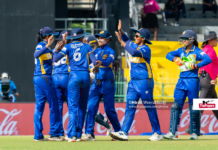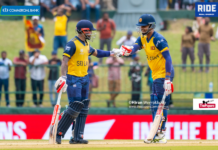This is not a column so much as an admission that has been striving for years to be outed.
I am not a fan of Kumar Sangakkara. I never have been.
This being a family publication, there remains the extent of my opinion.
On Saturday, Sangakkara confirmed he will be retiring from all cricket after the second Test against India later this summer. That will bring to an end a colossal career, of one of the true modern greats.
There is no doubting that, and what follows is not to poke holes in his achievements.
I just never warmed to him. A little part of it was aesthetic. Sangakkara’s batsmanship is widely drooled about like it was some beautiful piece of art, yet I always felt this was just the default reaction to him being left-handed. Cricket fetishises left-handedness.
Brian Lara was beautiful. David Gower was beautiful.
Nothing in life without curves can be truly beautiful and Sangakkara bats in straight lines, the elbows stiff like the upper lips of British royalty. His wrists might as well not exist. I will grant that Twenty20 opened a new vista on to his game, but in his recent, greatest years, a kind of bloodlessness defined his play.
The deluge of runs and records was so heavy — and this, I guess, qualifies as a compliment — it subsumed within it the craft of batting. Don Bradman’s average of 99.94 does the same, because within the vast shadow of that number, his actual, physical batting style is rarely evoked.
This is all subjective.
Someone out there, after all, probably thinks Alistair Cook bats beautifully as well. But Sangakkara’s batting fits into a bigger picture of the man, in which he is perfect and his you-know-what smells of roses.
It hardly matters if it is true but, for me at least, it is difficult to warm to perfection or even its perception. I can respect and acknowledge it, but do not ask me to love or celebrate it. As a result, I discovered my thoughts on Sangakkara are a corollary to those for his best buddy, business and batting partner, Mahela Jayawardene.
Jayawardene was not perfect, but he was enchanting. When he batted something inside you were stirred, either by its beauty or even its flaws. It stirred regardless. As captain he led with originality, unconstrained by conventional wisdoms.
Jayawardene seemed somehow a more authentic manifestation of Sri Lankan cricket. Sangakkara is otherworldly by his performances, but he also feels like an affectation, as a disciple of the influential cult of Steve Waugh, as is Rahul Dravid.
These are men who played tough but did so with a moral fortitude that cannot be questioned. It is a cult that propagates a new statesman-cricketer, swanning around the world giving important speeches at important functions, being seen as moral custodians of the game and its so-called spirit.
The earnestness grates.
Since giving the MCC Spirit of Cricket Lecture, Sangakkara is seen as a cricketing noble savage of sorts, a player untouched by the corrupting, decrepit influences of the game around him, a bulwark against the darkness.
In each case there was more appeal, not to mention a greater degree of genuineness, in the men who were their teammates but also their opposite forces: Shane Warne, Sourav Ganguly and Jayawardene.
They were their own men, warts and all, unique and somehow embodying their place and time better than their three great teammates. Of course, some do not agree, which is fine.
But, as a last resort, try placing Sangakkara through the prism of The Beatles, in particular, their leadership engine of John Lennon and Paul McCartney.
Lennon was quite obviously the edgier, more radical operator of the two, an unpredictable spectrum capable of producing great, stinking duds, but also unmatched hits. McCartney, always trying to please too many, was safe.
Cute, like puppies are safe and cute. Successful also, and legendary of course, but no Lennon, who in so many ways was more real and less manufactured than McCartney could ever be. In my mind, at least, there is no doubt which mould fits Jayawardene better and which one Sangakkara.
Tributes, such as they are, should end politely, so I will say that Lennon needed McCartney for The Beatles to be great.
















